The church’s catchphrase “all are welcome” is so common it seems like a meme. But what do these three simple words actually mean? Are they sincere or do dwindling congregations just hope to get people in the pews? Is it just what we think we should say?
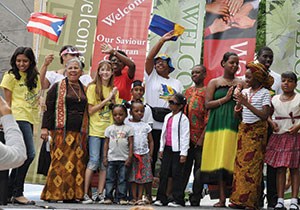
Our Saviour Lutheran Church, Jamaica, N.Y., hosts an annual carnival as a community outreach event. Food and activities are all free. The event helps people in the neighborhood learn about the church and meet members.
Welcoming isn’t simple. How churches welcome newcomers can often mean the difference between vibrant congregations and those that struggle.
“‘All are welcome’ used to mean those who look like us, act like us, have the same lifestyles and same values,” said Brenda Smith, ELCA program director for faith practices and missional development.
Smith, who served as a pastor in New York City before joining ELCA churchwide staff in Chicago, said the good news is that it’s 2016 and hospitality ministry is a faith practice.
“The new reality is that people are beginning to understand that ‘all are welcome’ means that all are welcome — regardless of race, color, creed, age, ethnicity, knowledge of Christ and sexual orientation.”
It also means that congregations need to be inclusive and understand that not everyone has grown up in the church, knows Jesus or can follow a worship service, she added.
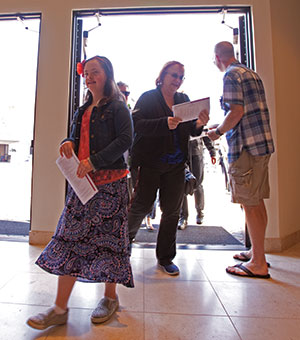
Dave Nagel
Katelyn Reed enters Messiah Lutheran Church, Yorba Linda, Calif., for worship after being welcomed by Rick Eckart, a greeter and usher.
“I’ve been in many churches where I visit incognito and would never go back because there was no hospitality,” she said. “Or the church was dirty and not maintained or had no place to change a baby diaper.” Worse yet, Smith said, sometimes congregational tension and drama were palpable.
“I often ask churches to think carefully about what environment they’re bringing people into,” she said.
While the words “all are welcome” seem innocent enough, they evoked a wide range of responses when The Lutheran asked its friends and followers if their congregations welcomed folks and to share examples of how they felt welcomed or not. That request produced more than 50 Facebook posts and emails, and 270 likes and almost 90 shares on Facebook.
Several respondents praised their church’s welcoming program, like Sarah Accettura of Holy Cross Lutheran, Libertyville, Ill., who said friendly Art Schmieding, 90, a greeter for more than 20 years, was one of the reasons she joined the congregation 10 years ago. “He was an incredibly warm person, and his intention was to make sure everyone felt welcomed and included,” she said. “He would engage in conversation about your life, what you had done this week, how you heard of us and how old your kids were.”
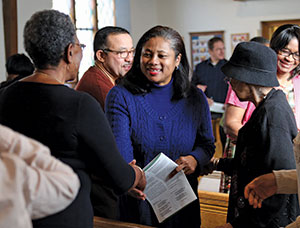
KRISTA KENNELL
Jennifer Pierre (in blue) shakes hands during Sunday worship at Our Saviour, which implemented a welcoming ministry that saved it from being closed.
Responses also included criticisms from those who had been hurt by the church, or people who visited a congregation and felt ignored.
Diane Pederson, a member of St. Timothy Lutheran, Naperville, Ill., still remembers how badly she felt after visiting a small Lutheran church with her family while vacationing in Florida 10 years ago: “The service was warm and lovely. But afterward, during the fellowship time in the small narthex, the 50 or so congregants happily greeted each other as we stood among them, ignored. We felt invisible.
“We never returned to that church because we never vacationed in that area again. But if we were snowbirds, we would’ve sought out a different church. As someone uncomfortable with small-talk chitchat with strangers, the feeling of invisibility was very strong for me. My more social husband felt it too.
“What their behavior said to us was they were a tight-knit church family, and they didn’t want strangers there. No wonder the congregation was so small and seemed so warm when observing from the pew. It was afterward when we wanted to compliment the congregation for the nice service that we realized the warmth was not for outsiders.”
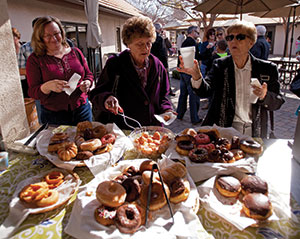
Dave Nagel
Christine Curl (left), Irma Mulder and Faye Phillips partake in treats and coffee during “Sunday morning hospitality” at Messiah, which views food as a universal language and offers coffee and doughnuts every week. Some churches have no coffee hour because they view it as too overwhelming for visitors.
It’s complicated
“Welcoming” is a complicated and emotional challenge that isn’t problematic only to the ELCA, said the church’s pastors who were interviewed for this story. They define a welcoming ministry as being inclusive and mindful of a congregation’s identity, recognizing members’ gifts and understanding what they are comfortable with, acknowledging the neighborhood, and assessing the needs of those to be welcomed. Pastors said there’s no one-size-fits-all approach to welcoming — one person’s welcome is another person’s wall.
Congregations, Smith said, would be smart to embrace the cultural norms of 2016, including the needs of young people and the lesbian, gay, bisexual and transgender (LGBT) community, the use of technology, people’s busy schedules and the fact that the church isn’t the center of life anymore. People often “church shop” and make judgments based on what they initially see and feel.
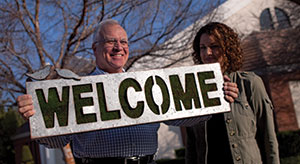
Dave Nagel
Jim Harter, with Carmen Pease, holds up the sign for the new welcome center at Messiah.
“People are looking for three things in a church,” Smith said. “One, a warm community that loves and follows Jesus; two, a place where they can learn something; and three, a church that is doing something to transform the world. Sometimes we’re woefully inadequate in all three.”
For shy or introverted people, an overly friendly greeting or coffee hour can be off-putting or cliquish. An extended sharing of the peace — where members walk around the sanctuary hugging people and chitchatting — might appear friendly to some newcomers and uncomfortable to others.
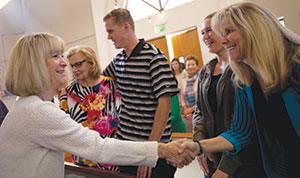
Dave Nagel
Kathi Shaheen (left) and Cheryl Hoffman greet one another during worship. This is formally called “passing of the peace,” but Messiah asks people to greet those around them in an effort to use language that is friendly to guests.
Craig Mueller, a pastor of Holy Trinity Lutheran, an urban Chicago church, is sensitive to the needs of newcomers and runs what he calls a general welcoming program, inclusive of both introvert and extrovert personalities and communication styles.
“What I’m finding these days in organized religion is that the welcome is the main thing connecting people,” Mueller said. “All churches say, ‘You are welcome,’ but part of that welcome is whoever you love or marry is welcome, too, and whatever you may think of church or organized religion, you are welcome.”
Holy Trinity has a long history of welcoming the LGBT community. Mueller said that (along with other factors) has helped create a welcoming and healthy church atmosphere.
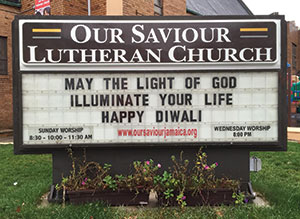
Mueller said church today is just different: “We often have a church full of people we don’t know. Our demographic is a community of young adults that pops in and out without being known. We want to give people the feeling that they can come and go on their own terms and give people their space. They need to know that they won’t be asked to be on a committee.”
This can be a problem for small Protestant congregations where members act like family, Mueller said. But this is the technology era, he added, where young people are used to communicating behind a screen, texting or emailing.
“A greater issue is ambivalence to organized religion,” Mueller said. “They value church but not in the way that we’re used to. Given that, we need to do church in new ways since we’re not the center of people’s lives.”
It’s OK, he added, to not know everyone in the congregation and to not greet them by name.
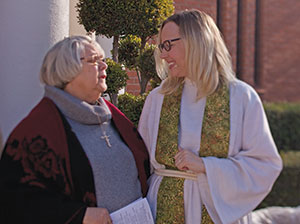
Dave Nagel
Angela Denker, a pastor of Messiah, greets Sue Lindemulder after worship. Denker says welcoming is about churches looking for their gifts and picking a niche.
Paula Swaim, who recently began attending Shepherd of Life Lutheran in Lake Elsinore, Calif., wrote to The Lutheran that her congregation has a good balance of being welcoming and allowing space. “The people were welcoming and helpful, but not in a fake ‘love-bombing’ fashion,” she said. “One lovely lady offered to sit next to me to help me understand the liturgy during the service. Another lovely lady gave me a brief tour of the facilities. I feel comfortable there. It’s perfect for me.”
Mueller, whose doctoral thesis was on technology and the decline in mainline denominations for the future, is often asked how his congregation manages to be welcoming to all. “The main thing that I’ve helped churches think about is to get over the family mentality — that everyone comes to be a family,” he said. “Some people like anonymity.
“The trick is in knowing how to do ministry on different paths. There’s a difference between warm and welcoming, as in shaking your hand, and dragging you to coffee hour or signing you up for a committee. We don’t ever want to appear desperate.”
In Jamaica, N.Y., the situation was fairly dire when Bob Fritch arrived at Our Saviour Lutheran Church 24 years ago. The congregation’s New York City neighborhood was evolving into a Caribbean-rim community, and Fritch said he was faced with changing how to do church or closing. The pastor began practicing a welcoming ministry that revitalized Our Saviour.
“We were a church slated to be closed, so a welcoming program does work,” he said.
Today Our Saviour is home to 250 worshipers at three Sunday services and is a congregation that is constantly changing in a transient neighborhood.
“We’re a melting pot of more than 20 nations of origin,” Fritch said. “For someone who isn’t of the majority to walk in [and] feel at home, that’s the winning combination.”
Fritch said his approach focused on going back to basics: “First, fix your signage, clean the bathrooms, and make sure that people can follow your worship service and it isn’t confusing.
“We’ve forgotten what we’re called to do — we’re not here to keep the clubhouse open. We’re called to bring God’s word, and we must do it in new and different ways.
“We live in a channel-changing society. If people don’t like what they see, they change the channel. It’s the same in the church today. You’ve got five minutes to get them before you’ll lose them, especially if you don’t let them know that they’re welcome.”
A church’s first welcome, Fritch said, is its website. He suggested making it clear and inviting since people will often Google search a church before visiting. “The website gets people into the front door even before they ever walk in,” he said, “so show photos of happy people and not just shots of the building.
“If you want to welcome the community, then welcome it. On our church exterior sign we acknowledge other religious holidays. That kind of action says who we are to the world. We put up Ramadan messages, Jewish New Year’s greetings and Diwali signs for our Hindu friends. It says we’re an open and welcoming church. We send blessings to our neighbors. That’s a part of getting people in the door before they come in the door.”
Our Saviour also avoids fellowship or coffee hours, which, “to quote Dickens, ‘are the best of times, the worst of times,’” Fritch said. “One thing I’ve found is that a coffee hour for an introvert is bad. An introvert doesn’t want attention drawn to him. And never ever make people stand at the end of service and say who they are or why they came — or wear a name tag. It’s horrible for a newcomer. They’ll never come back; we have not welcomed them.”
Fritch advised congregations to be true to themselves: “If you’re not yet a multicultural congregation, just be the best church you can be. Don’t try to be who you are not.”
Angela Denker, pastor of community life and discipleship at Messiah Lutheran Church in Yorba Linda, Calif., agreed: “Churches have to know who they are and be welcoming in a way that fits. If you’re a rural congregation, your approach is different from an urban congregation. Each church has to look for its gifts. We often try to be too many things to too many people, instead of picking a niche.”
When this fragmentation happens, she added, no one’s interests are well served.
Denker wrote about the phrase “all are welcome” for Sojourners magazine. She said barriers have developed, not through any fault of people in church but because of changes over the years. She highlighted three:
- Too often, all aren’t welcome after all. We create hoops for newcomers to jump through and unwritten rules, and people won’t explain the unwritten rules.
- All are welcome, including bullies. Sometimes the church doesn’t do a good enough job of exercising church discipline for those who need it.
- All are welcome and no one’s needs are met. We try to be everything to everyone. Everyone wants to be the church with lots of children’s programs, or the congregation with diversity, or one that helps the homeless. Pick a niche and stick with it.
“Where are we going?” Smith asked. “If we can’t see with our numbers diminishing that something needs to change, that our mindset needs to change, then I don’t know what will make a difference. Just having a sign that ‘all are welcome’ isn’t enough. You have to live that sign.”




